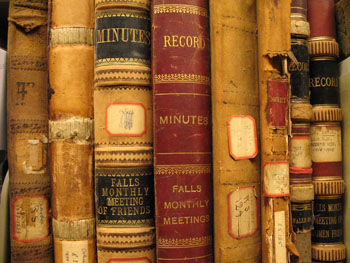Ann Upton oversees one of the nation’s largest collections of Quaker material
By Katie Greifeld
Magill Library’s Special Collections, home to Haverford College’s prized Quaker Collections, is as quiet and reverent as a Quaker meetinghouse itself. In a library that hums with the academic pursuits and activities of hundreds of elite liberal arts students, Haverford’s Special Collections library is a place of silence and scholarship.
It is fitting that Haverford College, a Quaker institution whose history is rooted in the area’s early days of Quakerism, houses these Collections. One can catch a glimpse of it as they make their way to the main tier bathrooms, which are located right next to the Special Collections’ heavy wooden doors.
In this serene place is the office of Ann Upton, Haverford’s Quaker Bibliographer and Special Collections Librarian. Upton, 60, does not look the part of the dowdy librarian portrayed in books and movies. Her handsome green, suede blazer matches her eyes too well to be a coincidence, and contrasts well with her light gray hair and the black sweater she’s wearing underneath. Gold studs line her jacket collar, a bold look that does not match her personality.
“I’m a little anxious,” Upton warned. “It’s good though – you’ll edit all this out and only take the good stuff!”
Though nervous about being interviewed, Upton was eager to speak about the Special Collections, which is home is “materials that are too fragile or rare to be in the main collections.” Special Collections materials include manuscripts, college archives, rare books, photographs, artifacts, and other primary source materials.
There are over 4,000 rare books, maps, and manuscripts in the Collections today. Notable items include the Morley family papers, an important family in the College’s foundational years, and the William Pyle Phillips collection, which contains four folios of William Shakespeare’s plays.
The Special Collections also houses the Quaker Collection, which Upton proudly describes as “the third best in the world.”
The Collection consists primarily of Quaker writings in the form of publications, manuscripts, letters, and diaries. It boasts approximately 35,000 printed volumes, including the journal of Margaret Hill Morris during the Revolutionary War, and personal letters between members of the Cope family.
The Haverford Quaker Collection also helps care for records of meetings in the Philadelphia and the Philadelphia Yearly meeting, a responsibility it shares with the Swarthmore College Friends Historical Library.
However, when asked if the Haverford Quaker Collection could be considered a ‘Quaker Museum’ of sorts, Upton responded with a laugh.
“It would not be an interesting one, as we have very few Quaker artifacts,” Upton explained. “With our Quaker Collection, you mostly have to interact in a different way than just looking at things.”
While this may be true for some, many scholars approach the Special Collections and Quaker Collection with delight. Roughly half of the people who visit the Collections are not affiliated with the College at all. This is especially true in the summertime – many scholars who frequent the Collections are professors themselves, pursuing their own research. In addition, the Collections also receives “an amazing number” of email requests for help.
Upton has been working as the Quaker Bibliographer and Special Collections librarian since 2002. Upton comes from a rich Quaker background, a faith she was born into.
“I’ve always been involved with a Society of Friends,” Upton recalled of her childhood in Bucks County, Pennsylvania. “Growing up, it seemed natural.”
Upton attended the Westtown School, a Quaker boarding school in West Chester, Pa. After graduation, Upton went to Earlham College, a Quaker institution in Indiana. During that period, Upton was a member of various Quaker meetings, depending on where she was located. Upton is currently a member of the Birmingham Quaker meeting in West Chester, Pa., where she lives.
When discussing the associations she has had with different Quaker meetings over the years, Upton was quick to assert that every Quaker meeting is unique.
“The community is defined by those who work and worship together, so each meeting has its own different feel,” Upton explained. “That’s why when people say, “Oh I went to meeting once, it was horrible,” you need to try another meeting – maybe it would be a better fit for you.”
When asked if working in the Quaker Collection has affected her faith, Upton paused for several moments. She rearranged her hands in her lap while she thought, her pale pink nail polish on display.
“My work here is primarily intellectual, and it’s mostly related to history,” Upton began. “But in my personal life and in my personal expression of my faith, it’s not intellectual, it’s spiritual, and it’s here and now – it’s not really historical.”
Upton, who describes herself as a practical person, explained the problem that she has often had to face: becoming out of balance. For a religious person tasked with dealing with the historical aspects of her faith, it can be easy to become unbalanced and find that “I’ve been working too much, or I haven’t been going to Meeting enough.”
“Both are important to me, and they help me stay balanced,” Upton said. “But I really need to pay attention to maintain that balance.”

